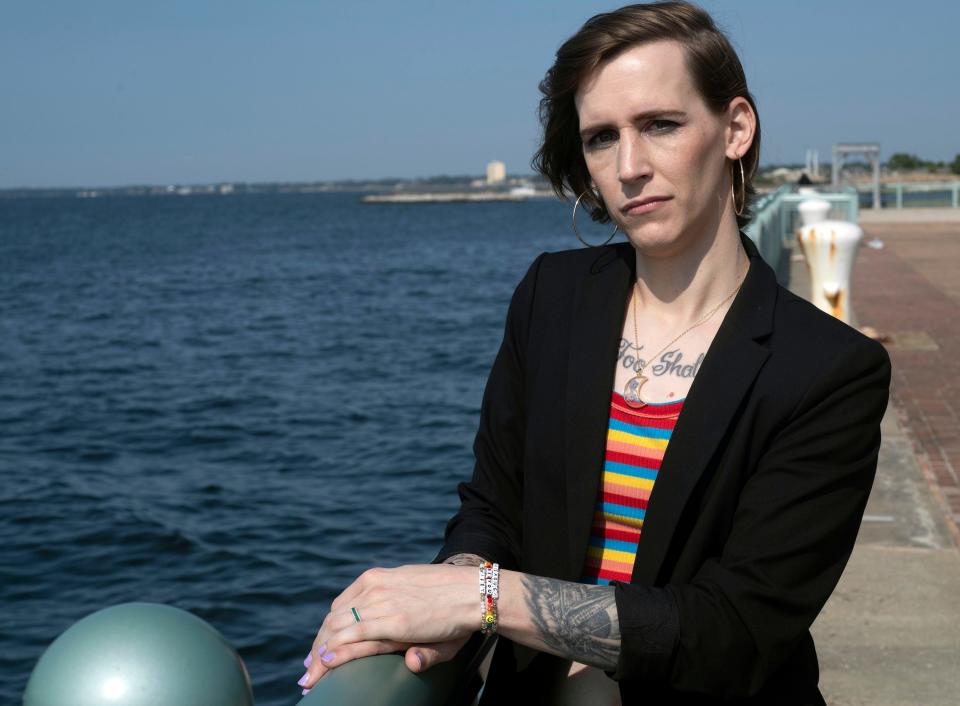She spent her life learning to love who she is. A new law threatens to undo it all.
- Oops!Something went wrong.Please try again later.
Pensacola resident Natalie Rockwell recently received the phone call from her doctor she had been dreading for months: Gov. Ron DeSantis had passed legislation restricting gender-affirming care.
Legislation signed by the governor on May 17, SB 254, mandates that physicians must be in the same room as their patient when providing gender affirming care.
Rockwell, 34, is a transgender woman whose care provider was Planned Parenthood in Tallahassee, which uses Spektrum Health to provide comprehensive primary healthcare options for LGBTQ+ patients and is one of the closest providers available that offers gender-affirming care. Since Rockwell is no longer able to use telehealth services to extend her prescription for estrogen pills and testosterone blockers, she is one of the many people scrambling to find a new provider before her prescriptions run out.
“Florida had for a while been kind of lagging behind some of the other red states when it came to a lot of the anti-trans legislation that we're seeing nationally,” Rockwell said. “But then all of a sudden, Florida had four or five different bills all get introduced around the same time and it was like they were (not only) playing catch up, but also they wanted to pass every other state at how hard they were going after trans people.”
What is SB254? Florida's transgender affirming care ban is now law. Here's what SB 254 does:
Laws targeting transgender people Four new Florida laws target transgender, broader LGBTQ community. Here's what they do

Much discussion of SB 254 has focused on its impact on minors. There are stipulations barring sex-reassignment prescriptions and procedures for patients younger than 18. There are changes allowing parents to seek custody of children “subjected” to or “threatened” with sex-reassignment treatment.
However, there are significant impacts for adults too. The new requirements that gender-affirming care must be in-person and with a doctor — rather than a nurse practitioner or physician's assistant — means far fewer options for patients and longer waiting lists for care.
As many as 80% of trans adults receive care from nurse practitioners, estimates Lana Dunn, chief operating officer for the LGBTQ health clinic Spektrum Health, an organization that sees about 2,500 patients who will be impacted by the legislation, including Rockwell.
Some individuals fear without gender-affirming care they will start to detransition, causing not only bodily changes but possibly harm to their mental health.
Rockwell said without her medications her skin will harden, her body odor and sweat will change, and she will start producing testosterone again. But the biggest concern is she will become anxious and severely depressed again — symptoms of her gender dysphoria — and her suicidal tendencies will come back.
Kelley Robinson, president of The Human Rights Campaign, a civil rights organization for the LGBTQ+ community, released a statement stating Gov. DeSantis is a “existential threat to every LGBTQ+ person in Florida and beyond.”
“Gov. Ron DeSantis and extremist legislators in Florida are some of the most anti-LGBTQ+ politicians in America. DeSantis has made clear that demonizing LGBTQ+ people will be the center of his legislative agenda and presidential run,” Robinson said. “As a result, the rights of millions of Floridians are being rolled back by politicians who are attacking the LGBTQ+ community at a breakneck pace to pander to the most extreme fringes of their base.”

Opponents of a recent swathe of anti-trans legislation say it takes away not just health care, but the purpose and dignity of many transgender people in Florida.
Pensacola roommates Bren Patchin, 25, and Valerie Setliff, 23, are both transgender. They lost access to their endocrinologists when SB 254 went into effect and have just six months of refills for their prescriptions.
Patchin identified as non-binary at 14, left his conservative family in California and began identifying as a transgender man at 19. While on a journey of self-discovery after high school, he began dismantling his own internalized transphobia, started taking his transition more seriously and has been on hormone replacement therapy for a year now.
Without gender-affirming care his estrogen levels will slowly build back up and start to combat the remaining testosterone in his body, he said. His body hair will stop growing, his period will begin again, and body fat will redistribute back to his face, hips and chest. He also predicts he will spiral into a psychological despair and horrible mood swings.
Identifying as a man gives him purpose and helps him fit more comfortably into his own skin.
“I describe it as like a big marble slab, and you start off as a marble slab and as you grow up you chisel away at it, and become the person you want to be,” Patchin said. “It's your home, we can decorate it however you want, it's your body that you're living in. So even if it means some people are gonna disagree with you, and some people are gonna be uncomfortable with that idea, it's still your home.”
Setliff was an air conditioning technician, swinging a hammer all day in a hot attic. She never felt like herself, just a cartoon representation of what society wanted her to be: a cisgender, heterosexual man.
She started experimenting with her gender and began hormone replacement therapy nearly two years ago.
“When you have clothes that don't fit, you can automatically feel it. There's just something not right, they're a little too baggy,” Setliff said describing the feeling of transitioning. “But whenever you find the right presentation on how you feel on the inside, and you find the lifestyle in which to live that, it's like putting Lego pieces together.”
Without gender-affirming care she would experience body hair growth, changes in the texture of her skin and hair, a brief period of hot flashes and fatigue, and then her testosterone recycling back. Setliff is diagnosed with bipolar disorder, so detransitioning will cause massive mood swings that will hurt her daily mental health functions.
Both Setliff and Patchin say they are worried about their safety and are working to leave the state to find the protection and care they deserve.

An American Medical Association journal study followed transgender and nonbinary youth, ages 13 to 20, over the span of 12 months. It found those who received gender-affirming hormones or puberty blockers had 60% lower odds of depression and 73% lower odds of self-harm or suicidal thoughts. The data suggests for a group who already have disproportionate mental health problems compared to their peers, access to gender-affirming care improves their lives.
Rockwell been working at understanding and expressing her own gender since the age of 5. She started coming to terms with what it is to be transgender, dismantling years of self-hate and accepting herself in her 20s. She finally came out to her wife and family in the last two years.
June should have seen Rockwell celebrating her one-year anniversary of starting hormone replacement therapy. Instead, her state is pushing her backward.
She sees the recent slate of bill as trying to eradicate the transgender community, but said throughout history the community has always found ways to prosper amongst opposition.
“For us as a community, you can't erase trans people. Trans people are not their medical care. So even though you take away our medical care, you can't take away our transness,” Rockwell said. “Trans people have existed since people have existed and we have always found a way to take care of ourselves in our community.”
USA TODAY NETWORK – FLORIDA reporter Kathryn Varn contributed to this report.
This article originally appeared on Pensacola News Journal: Pensacola's transgender community scrambles to find help amid SB 254

